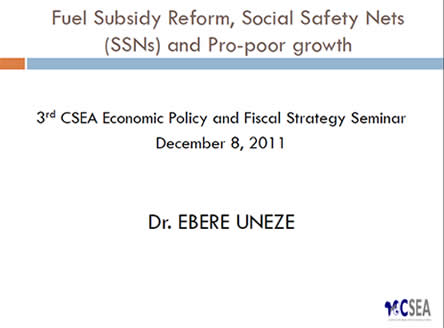Author:Ebere Uneze
Publication Date: December, 2011
Document Size:26pages
Key Message
A well designed safety net and social program can facilitate subsidy reform, and lead to inclusive growth, if successfully implemented.
Objectives
- Understand the goals of fuel subsidy reform and the important steps the Nigeria government can take to achieve successful reform
- Understand the link between Safety nets and growth, and how a well designed safety net program can help facilitate reform and inclusive growth
- Draw lessons from recent fuel subsidy reforms and suggest way forward

